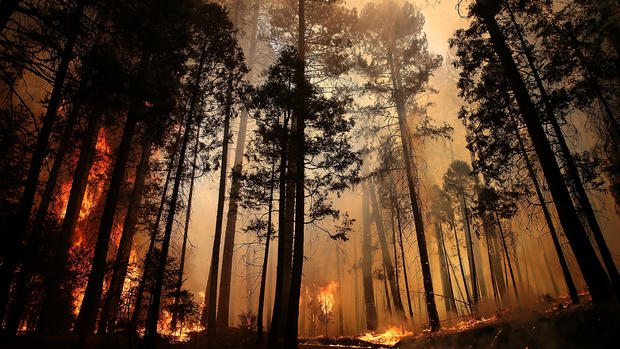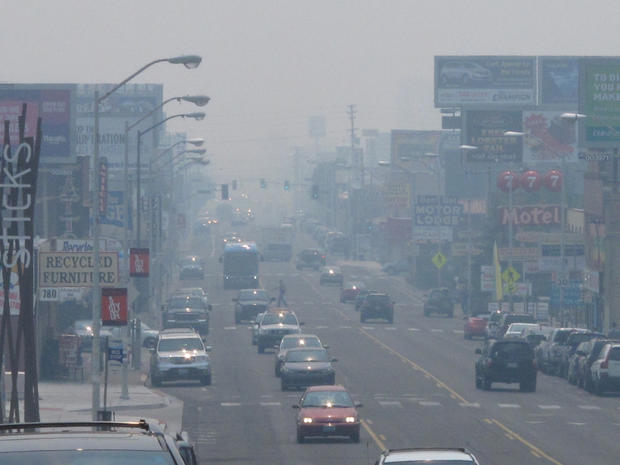Calif. fire prompts unhealthy air warnings in Nev.
Updated 6:04 p.m.
GROVELAND, Calif. The giant wildfire burning at the edge of Yosemite National Park has not only destroyed buildings and threatened water supplies, electricity and sequoias; it has also unleashed a smoky haze that has worsened air quality more than 100 miles away in Nevada.
The plume from the Rim Fire in California triggered emergency warnings in the Reno and Carson City area. Schoolchildren were kept inside for the second time in a week, people went to hospitals complaining of eye and throat irritation, and officials urged people to avoid all physical activity outdoors.
"It's five hours away," said 22-year-old bartender Renee Dishman in disbelief after learning that the source of the haze was more than 150 miles away. "I can't run. I can't breathe. It makes me sneeze."
The Rim Fire, so far, has burned through 292 square miles, destroyed 111 structures and threatened water supplies, hydroelectric power and giant sequoias.
Most of the structures that were destroyed are tent cabins and other outbuildings, but the figure includes 11 homes, said California fire spokesman Daniel Berlant.
Firefighters added a California National Guard Predator drone to their arsenal Wednesday to give them real-time views of flames chewing through rugged forests in and around Yosemite National Park.
As of that morning, authorities said the blaze was 23 percent contained, with crews aided by higher humidity continuing to make progress against it overnight.
"Our crews are getting the upper hand on this fire," Berlant said.
Crews plan to focus on structure defense along the southeast edge of the fire on Wednesday and continue constructing a contingency line ahead of communities to the north, including Tuolumne City.
- Nature, human policies led to giant wildfire at Yosemite
- Rim Fire's burn zone in Yosemite doubles overnight
- Firefighters gain ground on still-growing Yosemite wildfire
In Nevada, evidence of the Rim Fire is in the smoke-filled sky. The air quality index briefly surpassed the rare "hazardous" level east of Lake Tahoe before improving slightly. It hovered around the next-most serious stage of "very unhealthy" for all populations in the Reno-Sparks area 30 miles north.
Dennis Fry, a Reno auto body specialist for nearly 30 years, remembered smoke this thick when he worked on a logging crew and helped fight fires in Oregon during the 1970s.
"But never in Reno, not this bad," he said. "You could actually see the smoke inside my body shop."
Everyone should avoid all physical activity outdoors when the air quality index reaches "hazardous," considered "emergency conditions," the Nevada Division of Environmental Protection said on its website. "People with heart or lung disease, older adults and children should remain indoors and keep activity levels low."
Renown Regional Medical Center in Reno has experienced a "slight increase" in emergency room visits as a result of the smoke, said Jennifer Allen, the hospital's clinical nursing supervisor.
"Patients are experiencing shortness of breath, eye and throat irritation, cough and headache due to the heavy smoke and poor air quality," she said, adding that people with asthma and other respiratory ailments were most affected.
The pollution levels are among the worst ever recorded for small particulates around Carson City in the state's air monitoring records dating to 2000, according to JoAnn Kittrell, public information manager for Nevada Division of Environmental Protection. The air quality briefly moved into the "hazardous" level in some areas on Friday as well, she said.
"It's very unusual," she said. "We just happen to be in the direct path of the plume from Yosemite."
The previous peak reading in Reno came on Friday when the air quality index closed in on the "very unhealthy" stage. Schoolchildren were kept indoors during recess, high school football practices and scrimmages were canceled through the weekend and an annual air show at Lake Tahoe was canceled due to low visibility.
Carol Chaplin, executive director of the Lake Tahoe Visitors Authority, said some hotels and motels reported cancellations earlier in the week, but so far there hasn't been any major impact for the upcoming Labor Day weekend. "I could lie and say it's not affecting anything, but it is," she said. She said visibility in the scenic Tahoe Basin ebbs and flows with the shifting winds.
"I still see people out on the lake," she said. "At least we're not on fire."
The fire caused air pollution problems in California cities far away from the fire, including those in the Sacramento region.
Two dozen competitors in the 25th annual Best in the West Nugget Rib Cook-Off were taking it in stride as they prepped their grills for the barbeque festival running Wednesday through Labor Day in Sparks, Nev. The air around the event is usually filled with smoke, albeit a different kind when the barbeque festival's in town.
"You can't have too much smoke at a barbeque," said Mike Peters of Springfield, Mo., a member of the Kansas City Barbeque Society's Great American Barbeque Tour Team. "We're just going to add a little hickory smell to it."

